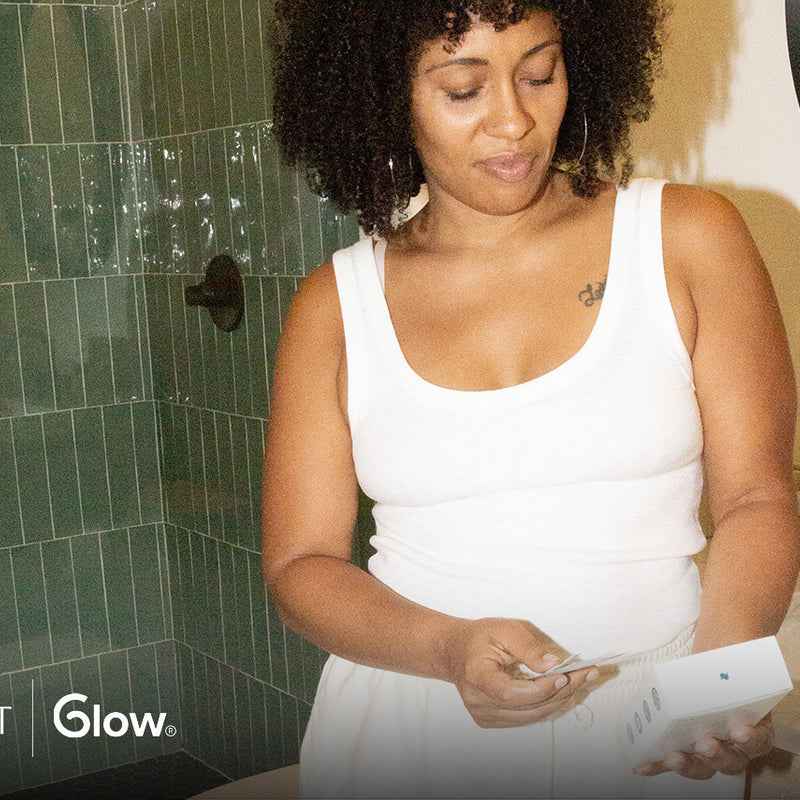CoQ10 for Egg Quality

Originally published 06/01/2023. Updated for accuracy and relevancy on 04/18/2024
Throughout your internet travels on various TTC forums and blogs, you've probably seen a mention or two about taking fertility supplements like CoQ10. But what exactly is CoQ10? And what does it have to do with those who are TTC? We sat down with OBGYN Dr. Kenosha Gleaton to find out.
Coenzyme Q10, oftentimes referred to as CoQ10, is a powerful antioxidant naturally found in the body and in many food sources. Also known as ubiquinone, CoQ10 is an essential component of cells needed for energy production. It is produced by the body and aids in the growth and maintenance of cells.
CoQ10 has shown a great deal of promise for those experiencing infertility, being linked to improving egg health, reducing oxidative stress, and providing overall fertility support.1 Although better quality and larger human studies are needed, CoQ10 treatment represents little risk, has few side effects, and will likely improve overall health parameters beyond fertility outcomes. Here are the most common questions I get about CoQ10 fertility benefits and function.
Is CoQ10 an Antioxidant (and What Does That Mean Anyways)?
CoQ10 is an antioxidant. Antioxidants are substances that protect cells from molecules known as free radicals—which are thought to contribute to heart disease, cancer, stroke, and other age-related illnesses. Antioxidants are also found naturally in many foods including fruits, vegetables, beans, whole grains, and legumes.
Who Is CoQ10 Recommended For?
In the fertility world, we generally recommend Coenzyme Q10 for patients who are suspected to have diminished ovarian reserve or low egg quality. Women with endometriosis also might find some benefit from taking CoQ10 as a dietary supplement.2 Our CoQ10 levels decrease as we age, and we think it is a critical component of keeping eggs healthy. Additionally, during pregnancy, CoQ10 helps egg cells to divide and grow appropriately. For this reason, a CoQ10 supplement can sometimes be recommended when it comes to pregnancy and female fertility.
How Much CoQ10 Should Be Taken in a Dosage?
CoQ10 is widely recommended for various ailments in different quantities ranging from 100mg - 1,200mg daily. While research on this powerful antioxidant has been steady over the last 60 years, there is no universally-accepted dosage for improving fertility outcomes. Most recommendations suggest 100-200mg per day for age-related infertility.
It's a good idea to check with your fertility specialist, OBGYN, or reproductive endocrinologist (REI) regarding whether a specific dosage may best benefit your particular condition. A thorough fertility test can also help in determining how much CoQ10 you should take.
Can CoQ10 Support Fertility When Trying To Get Pregnant?
Although studies are limited in human models, a promising study in 2017 evaluated whether CoQ10 levels within oocytes or eggs affect embryo quality and function.3 Higher CoQ10 levels within eggs were associated with better quality embryos, improved embryo function, and higher pregnancy rates.3 The results of this study were statistically significant, indicating that this difference is not simply due to chance.
Is It True That CoQ10 May Improve IVF Outcomes?
A challenging patient scenario for reproductive endocrinologists involves women who are poor responders to ovarian stimulation for IVF fertility treatment. Many of these women receive high doses of injectable drugs in attempts to stimulate their ovaries to produce sufficient eggs for treatment.
A recent meta analysis —a study combining multiple smaller studies—was performed on women who were poor responders in order to evaluate the effect of additional treatments on ovarian response.4 With more than 6,000 women included, this study provides robust clinical support that adding CoQ10 to IVF regimens can increase clinical pregnancy rates and reduce the amount of injectable drugs needed to stimulate ovaries, making it a promising tool for fertility preservation.4
Can Men Benefit From CoQ10?
It's important to take a comprehensive approach when looking at fertility. Since the factor of male infertility ranges from 30-50% amongst infertile couples (read more on this in our Guide to Male Fertility), it's important to take a comprehensive approach when looking at fertility. CoQ10 has shown promise for enhancing both male and female fertility. Learn more about the CoQ10 benefits for men in our blog.
In a meta-analysis published in 2018, researchers concluded that CoQ10 supplementation resulted in better sperm motility along with improved sperm concentrations and sperm count.5 For infertile men dealing with a low sperm count or poor sperm quality, this could be an important addition to their supplement regime. And to no surprise, there's no universally accepted dose; however, most studies support anywhere from 100 mg/day 6 to 300 mg/day.7 Men should ask their reproductive endocrinologist or urologist about adding Coenzyme Q10 supplementation to their regimen and their optimal dose.
Our Prenatal for him contains 200 mg of CoQ10 per serving, a dose that could help improve overall reproductive health.
How Long Does It Take CoQ10 To Improve Egg Quality?
Consistent supplementation with CoQ10 can improve egg quality in 3-4 months, around the time it takes for an egg follicle to mature. Research suggests that the positive effects on egg health become more noticeable with continued use over this timeframe.
Some studies have demonstrated that after just 2 months, CoQ10 had an impact on lowering follicle-stimulating hormone (FSH) levels. This reduction in FSH plays a crucial role in supporting ovarian function and addressing concerns related to a diminished ovarian reserve.8,9
How Long Does It Take for CoQ10 To Improve Sperm Quality?
Similar to eggs, sperm develops over the course of a roughly 3 month cycle. Research indicates that supplementing with CoQ10 consistently over a few months can improve sperm count and motility, contributing to better sperm quality and male fertility overall.
In a study on males with idiopathic oligoasthenoteratozoospermia (OAT), a dose of 400 mg/day resulted in significant improvements of semen parameters after 6 months.10 The study further emphasized CoQ10’s effect of improving antioxidant capacity, a crucial factor in reducing oxidative stress and enhancing male fertility.
Who Should Not Take CoQ10?
CoQ10 is generally considered safe for many individuals, but certain groups should exercise caution before starting CoQ10 supplementation. Individuals on blood thinners or medication for high blood pressure should avoid taking CoQ10, as it can decrease the effectiveness of these medications. Learn more about what medications should not be taken with CoQ10 in our blog. Pregnant or breastfeeding women should also exercise caution, as the safety of CoQ10 in these circumstances is not fully established.
It’s crucial to seek personalized guidance from a medical professional before incorporating any new dietary supplement into your routine, particularly if you are on medication or have underlying health conditions.
When Should I Stop Taking CoQ10?
There is no limit to the duration of CoQ10 supplementation. However, it’s recommended to stop taking CoQ10 or reduce your dose for fertility purposes as soon as you become pregnant and while breastfeeding, unless discussed otherwise with your doctor. Research on the safety of CoQ10 while pregnant is not fully conclusive, with some reports indicating negative pregnancy outcomes and others suggesting potential benefits. As always, it’s best to practice caution and ask your doctor for personalized advice regarding your fertility plan.
A Powerful Antioxidant
CoQ10 is a powerful antioxidant naturally found in the body and in many food sources. The benefit of CoQ10 production extends to both egg and sperm health. It has shown a great deal of promise with the potential to affect various female and male fertility parameters in those experiencing infertility. Although better quality and larger human studies are needed, CoQ10 treatment represents little risk, has few side effects, and will likely improve overall health parameters beyond fertility.
When selecting which CoQ10 supplement is right for you, focus on choosing one that is easily absorbed, highly bioavailable, and free of preservatives and artificial additives.
Dr. Kenosha Gleaton is board-certified in gynecology and obstetrics and is the Medical Advisor of Natalist. She received her MD from MUSC and completed her residency at Carolinas Medical Center in Charlotte, NC.
Dr. Gleaton is passionate about women, youth, and mentoring. She is a Scrubs Camp instructor, a program to increase student entry in healthcare, and serves as a Compassion International adoptive parent. She is also a member of the American College of Obstetrics & Gynecology, the American Association of Gynecologic Laparoscopists, and the American Association of Professional Women.
Sources:
- Xu Y, Nisenblat V, Lu C, et al. Pretreatment with coenzyme Q10 improves ovarian response and embryo quality in low-prognosis young women with decreased ovarian reserve: a randomized controlled trial. Reproductive biology and endocrinology: RB&E. 2018;16(1):29. doi:https://doi.org/10.1186/s12958-018-0343-0
- Naji TS, Al- Rubae’I SHN, Turki KM. The association between hormonal variation, antioxidant status and oxidative stress in Iraqi women with endometriosis. Journal of the Faculty of Medicine Baghdad. 2016;58(2):192-196. doi:https://doi.org/10.32007/jfacmedbagdad.582242
- Akarsu S, Gode F, Isik AZ, Dikmen ZG, Tekindal MA. The association between coenzyme Q10 concentrations in follicular fluid with embryo morphokinetics and pregnancy rate in assisted reproductive techniques. Journal of Assisted Reproduction and Genetics. 2017;34(5):599-605. doi:https://doi.org/10.1007/s10815-017-0882-x
- Zhang Y, Zhang C, Shu J, et al. Adjuvant treatment strategies in ovarian stimulation for poor responders undergoing IVF: a systematic review and network meta-analysis. Human Reproduction Update. 2020;26(2):247-263. doi:https://doi.org/10.1093/humupd/dmz046
- Salas-Huetos A, Rosique-Esteban N, Becerra-Tomás N, Vizmanos B, Bulló M, Salas-Salvadó J. The Effect of Nutrients and Dietary Supplements on Sperm Quality Parameters: A Systematic Review and Meta-Analysis of Randomized Clinical Trials. Advances in Nutrition. 2018;9(6):833-848. doi:https://doi.org/10.1093/advances/nmy057
- Thakur AS. Effect of Ubiquinol Therapy on Sperm Parameters and Serum Testosterone Levels in Oligoasthenozoospermic Infertile Men. JOURNAL OF CLINICAL AND DIAGNOSTIC RESEARCH. Published online 2015. doi:https://doi.org/10.7860/jcdr/2015/13617.6424
- Majzoub A, Agarwal A. Systematic review of antioxidant types and doses in male infertility: Benefits on semen parameters, advanced sperm function, assisted reproduction and live-birth rate. Arab Journal of Urology. 2018;16(1):113-124. doi:https://doi.org/10.1016/j.aju.2017.11.013
- Bentov Y, Hannam T, Jurisicova A, Esfandiari N, Casper RF. Coenzyme Q10 Supplementation and Oocyte Aneuploidy in Women Undergoing IVF-ICSI Treatment. Clin Med Insights Reprod Health. 2014 Jun 8;8:31-6. https://doi.org/10.4137/CMRH.S1468
- Xu, Y., Nisenblat, V., Lu, C. et al. Pretreatment with coenzyme Q10 improves ovarian response and embryo quality in low-prognosis young women with decreased ovarian reserve: a randomized controlled trial. Reprod Biol Endocrinol 16, 29 (2018). https://doi.org/10.1186/s12958-018-0343-0
- Alahmar AT. The impact of two doses of coenzyme Q10 on semen parameters and antioxidant status in men with idiopathic oligoasthenoteratozoospermia. Clin Exp Reprod Med. 2019 Sep;46(3):112-118. https://doi.org/10.5653/cerm.2019.00136
Sign Up For 10% Off Your First Order!
Sign up for insider access, exclusive deals, and OBGYN insights!
Reach Out, We're Here
Have questions about your order or products? For the speediest answer, check out our FAQ section. Need something else? Come find us below.
Customer Support
support@natalist.com
Press Inquiries
media@everlyhealth.com
Business & Partnerships
team@natalist.com
Affiliates + Influencers
team@natalist.com
Job Openings
Careers Page























